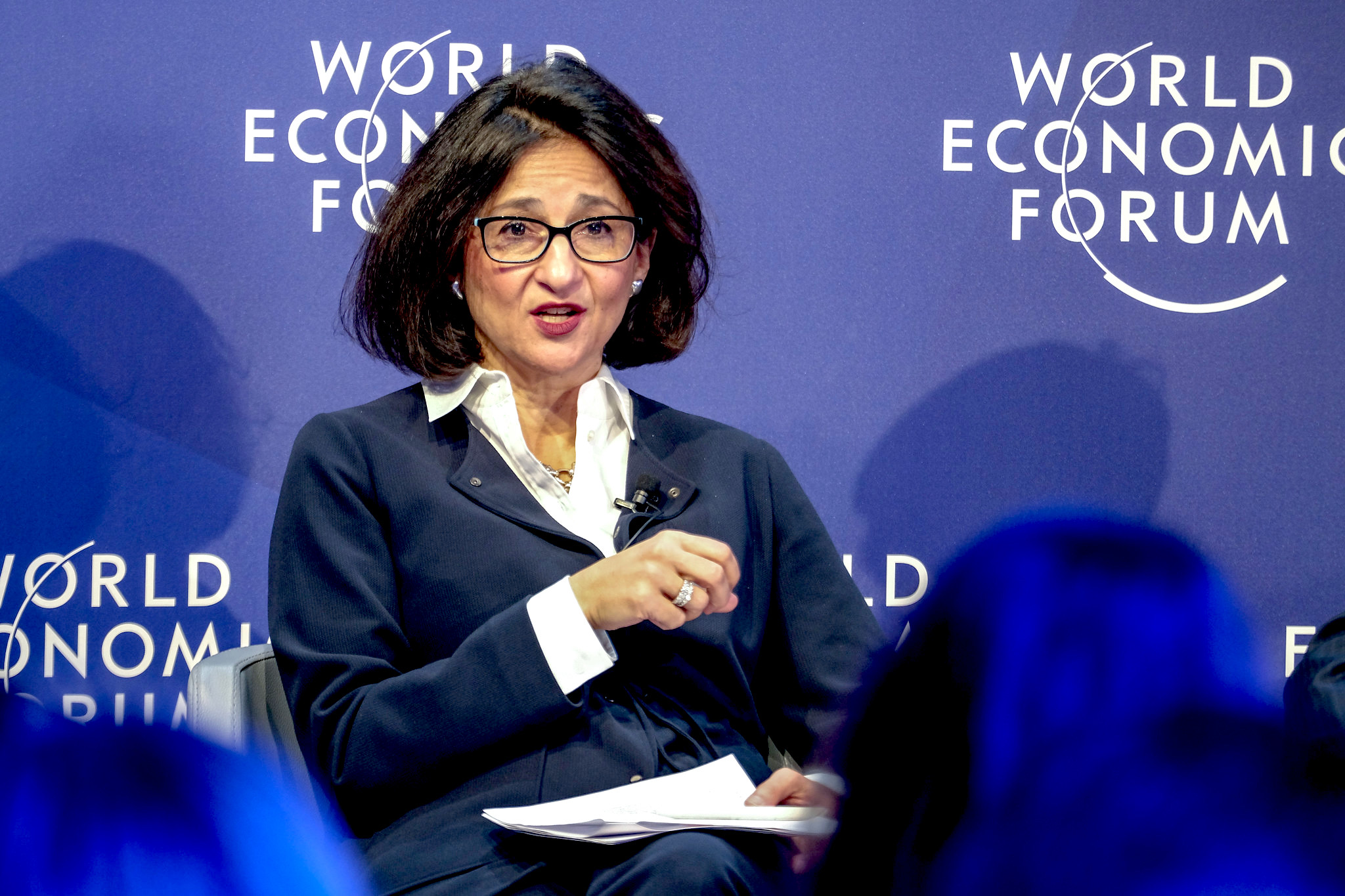Pro-Palestine student organizers at the university celebrated the departure of Minouche Shafik and vowed to keep up the pressure on the institution’s leadership to divest from Israel.

Minouche Shafik at the World Economic Forum in Davos, Switzerland, in 2019. (Walter Duerst, WEF, Flickr, CC BY-NC-SA 2.0)
The president of Columbia University announced her resignation late Wednesday, months after she authorized a violent police crackdown on student demonstrators urging the school to divest from Israel over the country’s devastating assault on the Gaza Strip.
Minouche Shafik said in her announcement that recent months have been “a period of turmoil where it has been difficult to overcome divergent views across our community.” Dozens of Columbia students were arrested and injured during a Shafik-approved police raid of a campus building in late April.
“This period has taken a considerable toll on my family, as it has for others in our community,” said Shafik, whose resignation was effective immediately. “Over the summer, I have been able to reflect and have decided that my moving on at this point would best enable Columbia to traverse the challenges ahead.”
Pro-Palestine student organizers at Columbia — a university at the center of the protest movement that swept the country earlier this year — celebrated Shafik’s departure but vowed to continue pressuring the institution’s leadership to divest from Israel.
Students specifically demanded that Columbia drop its Tel-Aviv Global Center project, which also drew backlash from faculty members when it was announced last year.
Shafik was adamant that Columbia “will not divest from Israel.”

Gaza solidarity encampment at New York’s Columbia University on April 21. (Abbad Diraniya, Wikimedia Commons, CC0)
Columbia Students for Justice in Palestine said in response to Shafik’s resignation that “after months of chanting ‘Minouche Shafik you can’t hide,’ she finally got the memo.”
“To be clear,” the group added, “any future president who does not pay heed to the Columbia student body’s overwhelming demand for divestment will end up exactly as President Shafik did.”
[Shafik also angered pro-Israeli donors and members of Congress who also put pressure on her. Both sides seem happy to see her go. The New York Times reported today:
“Facing accusations that she was permitting antisemitism to go unchecked on campus, Dr. Shafik made a conciliatory appearance before Congress in April that ended up enraging many members of her own faculty. She summoned the police to Columbia’s campus twice, including to clear an occupied building. The moves angered some students and faculty, even as others in the community, including some major donors, said she had not done enough to protect Jewish students on campus.” …
Representative Elise Stefanik, a Republican of New York who led some of the most intense rounds of questioning during the congressional hearings, celebrated Dr. Shafik’s resignation and in a statement, credited the Congressional committee for pushing it to happen. “Three down, so many to go,” she said.]
The Columbia chapter of Jewish Voice for Peace wrote on social media that students “will never forget the sheer violence unleashed upon us by Minouche Shafik, and we will not be placated by her removal as the university’s repression of the pro-Palestinian student movement continues.”
The students of Columbia will never forget the sheer violence unleashed upon us by Minouche Shafik, and we will not be placated by her removal as the university’s repression of the pro-Palestinian student movement continues. https://t.co/2KzgbzucA8
— BC/CU Jewish Voice for Peace (@JVPColumbia) August 15, 2024
Mahmoud Khalil, a student negotiator for Columbia University Apartheid Divest, told The New York Times on Wednesday that “regardless of who leads Columbia, the students will continue their activism and actions until Columbia divests from Israeli apartheid.”
“We want the president to be a president for Columbia students, answering to their needs and demands, rather than answering to political pressure from outside the university,” said Khalil.
Jake Johnson is a senior editor and staff writer for Common Dreams.
This article is from Common Dreams.
Views expressed in this article and may or may not reflect those of Consortium News.

Present-day students become future alumni donors, or maybe non-donors, if administrators like Shafik treat them with too much contempt.
Still, I hope the woes of student demonstrators don’t distract us from Gazans being massacred.
“We want the president to be a president for Columbia students, answering to their needs and demands, rather than answering to political pressure from outside the university,” said Khalil. A quaint notion from another time, unfortunately. Today, like virtually all university administrations, Shafik’s was interested only in protecting of the school’s funding, much of which is federal and defense industry-oriented, and its “brand” — not in freedom of expression or any forthright discussion with their students on what is the central moral and political issue of the day. Many would blame that on the fact that she had not come from an academic background, but from a career with the Bank of England and the World Bank. But that was hardly accidental. Just watch from where her permanent successor will be drawn. Columbia, the Ivy League and most other large universities long ago ceased to be academies of learning and intellectual ferment — they are now simply corporations, concerned only with what they perceive to be the bottom line and keeping the pipeline of eager-to-please servants of the neoliberal establishment flowing.
Well, good riddance. One small step in a better direction.
Ah the large print givers the DEI and the small print taketh away.
That’s Baroness Minouche Shafik.
Perhaps she’d have been a tiny bit better if her CV included time as a struggling Assistant Professor at a major university, instead of going from PhD to the World Bank and IMF, only later becoming head of the London School of Economics.
Boy, that resume sure doesn’t scream a dedication to academic dedication..